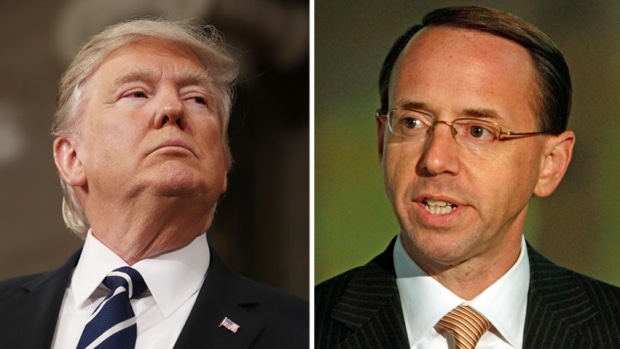“When this comes up, everyone says, ‘That’s the death march. That’s not going to accomplish anything.'”
Developments on Day 372 of the Trump Administration:
Trump Unsettled by Inability to Fire Special Counsel
Under pressure from the Trump-Russia investigation, Donald Trump again turns against Deputy Attorney Rod Rosenstein, possibly out of frustration that Special Counsel Robert Mueller cannot be removed.
“Four sources familiar with the situation” said Trump is complaining about Rosenstein and even talking about his dismissal. According to one source, Trump has been saying, “Let’s fire him, let’s get rid of him,” before his advisers step in to block the idea.
Trump’s frustration with Rosenstein stems from the Deputy Attorney General’s formal authority over the Trump-Russia inquiry. Attorney General Jeff Sessions has had to recuse himself because of his contacts with Russian Ambassador Sergey Kislyak, so Rosenstein is the only official who can remove Special Counsel Robert Mueller.
On Thursday, it was confirmed that Trump sought the dismissal of Mueller last June. White House lawyer Don McGahn refused to issue the command to Rosenstein, saying he would quit instead.
See TrumpWatch, Day 371: Trump Tried to Fire Mueller Last June
A month earlier, Rosenstein had covered Trump’s removal of FBI Director Comey with a memorandum falsely claiming it was over the FBI Director’s handling of the inquiry into Hillary Clinton’s e-mails. However, with the blocking of his attempt to fire Mueller, Trump turned against the Deputy Attorney General:
I am being investigated for firing the FBI Director by the man who told me to fire the FBI Director! Witch Hunt
— Donald J. Trump (@realDonaldTrump) June 16, 2017
Sources spoke of continued resistance to Trump’s outbursts about Rosenstein. “When this comes up, everyone says, ‘That’s the death march. That’s not going to accomplish anything,'” said one.
White House special counsel Ty Cobb said in a statement:
We do not find it to be a coincidence that there is an onslaught of false stories circulating in what appears to be a coordinated effort to distract and deflect from new revelations about already reported bias and corruption. We continue to cooperate with the Special Counsel and out of respect for that process will not weigh in further.
The Department of Justice declined to comment.
Top GOP Fundraiser Wynn Faces Multiple Accusations of Sexual Misconduct
Billionaire CEO Steve Wynn, the leading fundraiser for the Republican Party, has been accused of sexual misconduct by dozens of current and former employees.
The Wall Street Journal said the employees spoke of “behavior that cumulatively would amount to a decades-long pattern of sexual misconduct”. Some described being pressured into performing sex acts with him.
Wynn denied that he ever assaulted anyone. The billionaire and Wynn Resorts, setting aside the employees’ account, said the article reflects allegations made in court by his ex-wife “in her legal battle”.
However, the firm formed a special committee to investigate the allegations.
GOP legislators and allies of Donald Trump, having demanded the Democratic Party return donations by film mogul Harvey Weinstein after he was accused of sexual abuse, are under pressure to remove Wynn from his fundraising position.
The Journal said it contacted over 150 current and former employees. The majority of those who spoke were concerned that talking to the media would hurt their job opportunities, citing Wynn’s vast and powerful influence throughout Nevada and the casino industry, according to the article.
Trump Administration Removes Policy Restricting Hazardous Pollutants
The Trump Administration is withdrawing a decades-old air policy trying to restrict some of the largest sources of hazardous pollutants, such as mercury and lead.
The Environmental Protection Agency — which under its head Scott Pruitt has turned against environmental protection — said late Thursday that it is getting rid of requirements that permanently classify site as “major sources” of hazardous air pollution once they meet that classification.
Industry groups claim that the “once-in always-in” policy punished firms such as factories and other sites under heavy regulation even if they made improvements.
Once a “major source” reduces its pollution below the threshold, it no longer has to keep using the best equipment to continue reductions.
The affected pollutants include arsenic, asbestos, benzene, chloroform, cyanide, formaldehyde, lead, and mercury.
US Representative Ed Markey reacted on Twitter:
This could be the worst environmental sin yet from the Trump admin.
Allowing industrial facilities to spew more toxic pollutants like arsenic, mercury & lead into the air is like pouring sewage into our neighborhoods & pumping poisons into our bodies.https://t.co/HCwzRhcwjd
— Ed Markey (@SenMarkey) January 26, 2018

